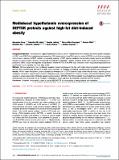| dc.contributor.author | Caron, Alexandre | |
| dc.contributor.author | Labbé, Sébastien M. | |
| dc.contributor.author | Lanfray, Damien | |
| dc.contributor.author | Blanchard, Pierre-Gilles | |
| dc.contributor.author | Villot, Romain | |
| dc.contributor.author | Roy, Christian | |
| dc.contributor.author | Richard, Denis | |
| dc.contributor.author | Laplante, Mathieu | |
| dc.contributor.author | Sabatini, David | |
| dc.date.accessioned | 2016-12-27T20:14:55Z | |
| dc.date.available | 2016-12-27T20:14:55Z | |
| dc.date.issued | 2015-12 | |
| dc.date.submitted | 2015-11 | |
| dc.identifier.issn | 1096-7192 | |
| dc.identifier.issn | 1096-7206 | |
| dc.identifier.uri | http://hdl.handle.net/1721.1/106150 | |
| dc.description.abstract | Background/Objective: The mechanistic target of rapamycin (mTOR) is a serine–threonine kinase that functions into distinct protein complexes (mTORC1 and mTORC2) that regulate energy homeostasis. DEP-domain containing mTOR-interacting protein (DEPTOR) is part of these complexes and is known to dampen mTORC1 function, consequently reducing mTORC1 negative feedbacks and promoting insulin signaling and Akt/PKB activation in several models. Recently, we observed that DEPTOR is expressed in several structures of the brain including the mediobasal hypothalamus (MBH), a region that regulates energy balance. Whether DEPTOR in the MBH plays a functional role in regulating energy balance and hypothalamic insulin signaling has never been tested.
Methods: We have generated a novel conditional transgenic mouse model based on the Cre-LoxP system allowing targeted overexpression of DEPTOR. Mice overexpressing DEPTOR in the MBH were subjected to a metabolic phenotyping and MBH insulin signaling was evaluated.
Results: We first report that systemic (brain and periphery) overexpression of DEPTOR prevents high-fat diet-induced obesity, improves glucose metabolism and protects against hepatic steatosis. These phenotypes were associated with a reduction in food intake and feed efficiency and an elevation in oxygen consumption. Strikingly, specific overexpression of DEPTOR in the MBH completely recapitulated these phenotypes. DEPTOR overexpression was associated with an increase in hypothalamic insulin signaling, as illustrated by elevated Akt/PKB activation.
Conclusion
Altogether, these results support a role for MBH DEPTOR in the regulation of energy balance and metabolism. | en_US |
| dc.language.iso | en_US | |
| dc.publisher | Elsevier | en_US |
| dc.relation.isversionof | http://dx.doi.org/10.1016/j.molmet.2015.11.005 | en_US |
| dc.rights | Creative Commons Attribution-NonCommercial-NoDerivs License | en_US |
| dc.rights.uri | http://creativecommons.org/licenses/by-nc-nd/4.0/ | en_US |
| dc.source | Elsevier | en_US |
| dc.title | Mediobasal hypothalamic overexpression of DEPTOR protects against high-fat diet-induced obesity | en_US |
| dc.type | Article | en_US |
| dc.identifier.citation | Caron, Alexandre et al. “Mediobasal Hypothalamic Overexpression of DEPTOR Protects against High-Fat Diet-Induced Obesity.” Molecular Metabolism 5.2 (2016): 102–112. | en_US |
| dc.contributor.department | Massachusetts Institute of Technology. Department of Biology | en_US |
| dc.contributor.department | Whitehead Institute for Biomedical Research | en_US |
| dc.contributor.department | Koch Institute for Integrative Cancer Research at MIT | en_US |
| dc.contributor.mitauthor | Sabatini, David | |
| dc.relation.journal | Molecular Metabolism | en_US |
| dc.eprint.version | Final published version | en_US |
| dc.type.uri | http://purl.org/eprint/type/JournalArticle | en_US |
| eprint.status | http://purl.org/eprint/status/PeerReviewed | en_US |
| dspace.orderedauthors | Caron, Alexandre; Labbé, Sébastien M.; Lanfray, Damien; Blanchard, Pierre-Gilles; Villot, Romain; Roy, Christian; Sabatini, David M.; Richard, Denis; Laplante, Mathieu | en_US |
| dspace.embargo.terms | N | en_US |
| dc.identifier.orcid | https://orcid.org/0000-0002-1446-7256 | |
| mit.license | PUBLISHER_CC | en_US |
